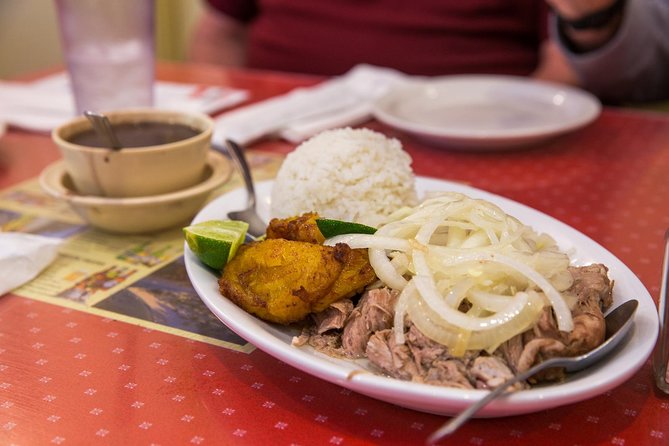Step into the centuries-old tradition of ikebana, the art of Japanese flower arrangement, in the heart of Kyoto. This captivating 1-hour workshop immerses you in the serene beauty of a traditional Japanese house and its tranquil garden. Under the guidance of Junko Sophie Kakizaki, a descendent of a renowned samurai family, you’ll explore the intricate techniques and symbolic meanings of this ancient practice. As you create your own unique floral arrangement, you’ll gain a deeper appreciation for the harmony and balance that define Japan’s enduring cultural legacy. What secrets will the art of ikebana reveal?
Key Points
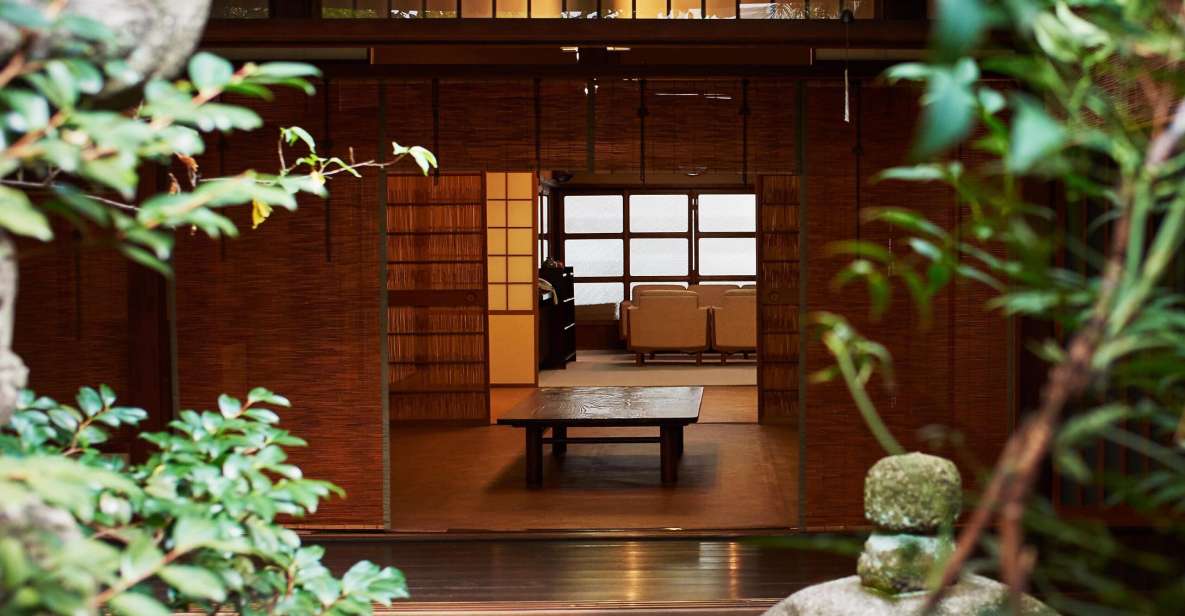
- Hands-on workshop to learn the ancient art of ikebana (Japanese flower arrangement) from a descendent of a samurai family in a traditional Japanese house in Kyoto.
- Participants create unique floral arrangements using specialized tools and learn the intricate techniques and symbolic meanings of this centuries-old practice.
- The workshop is set in a serene traditional Japanese garden, offering a captivating sensory experience and the opportunity to connect with the natural world.
- Gain insights into the harmony and balance that define Japanese aesthetic sensibility, as well as the philosophical and spiritual underpinnings of ikebana.
- Immerse in the rich tapestry of authentic Japanese culture and develop a deeper appreciation for the enduring legacy of this centuries-old tradition.
More tours and experiences nearby.
About the Activity
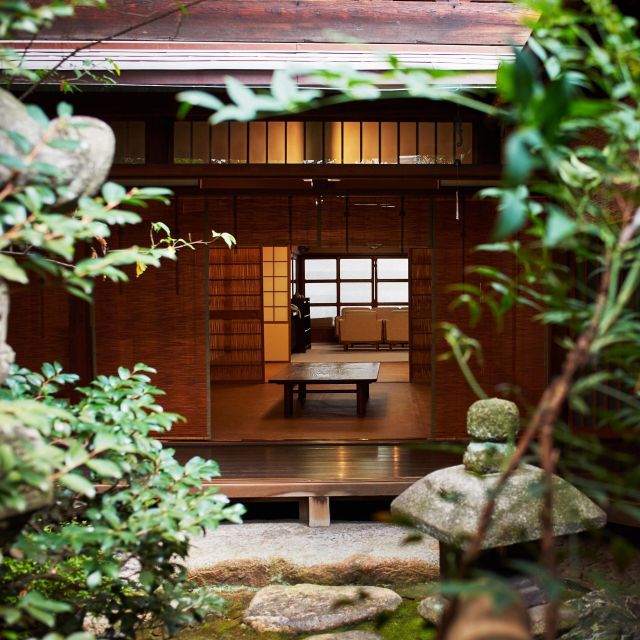
The activity is a one-hour flower arrangement workshop that takes place at a traditional Japanese house in Kyoto, offering participants an immersive experience in authentic Japanese culture.
The group size is limited to 5 participants, ensuring a personalized and intimate setting.
During the workshop, attendees will learn the art of ikebana, or Japanese flower arranging, from a descendent of an ancient samurai family, Junko Sophie Kakizaki.
Participants will work with a variety of fresh flowers and materials, using specialized tools like flower scissors and kenzan.
The activity can be tailored to include the creation of chabana, the flowers used in Japanese tea ceremonies.
The workshop will take place rain or shine, providing a unique cultural encounter in the heart of Kyoto.
Flower Arrangement Workshop
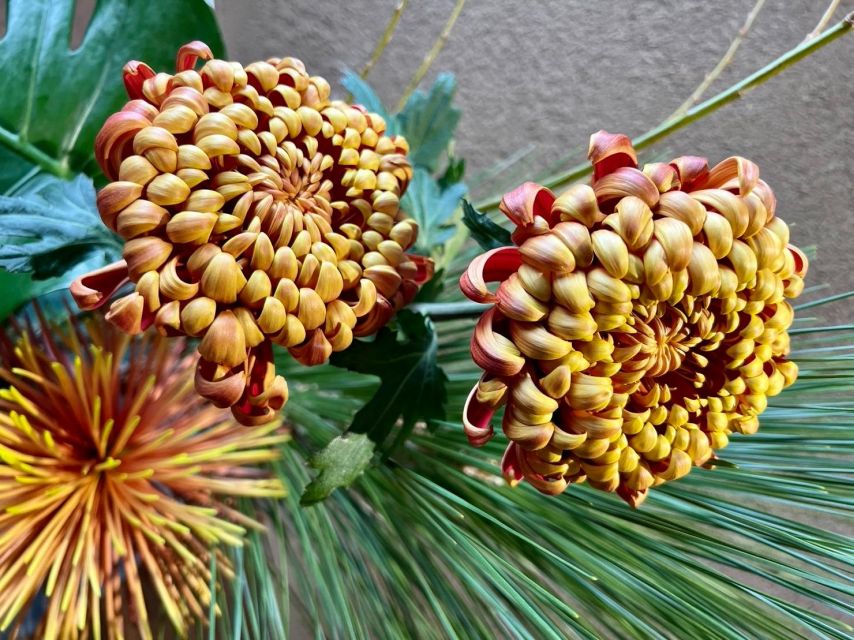
Participants enjoy the ancient art of ikebana, or Japanese flower arranging, during this hands-on workshop led by a descendent of an esteemed samurai family.
Under Junko Sophie Kakizaki‘s expert guidance, they learn the intricate techniques and principles of this centuries-old practice. Using an array of fresh flowers and specialized tools, attendees carefully craft their own unique arrangements, infusing each with symbolic meaning and aesthetic harmony.
The serene setting of a traditional Japanese garden provides the perfect backdrop, allowing participants to fully appreciate the meditative nature of ikebana. By the end of the session, they’ve not only created a beautiful piece of floral art but also gained a deeper understanding of this revered cultural tradition.
Japanese Garden View
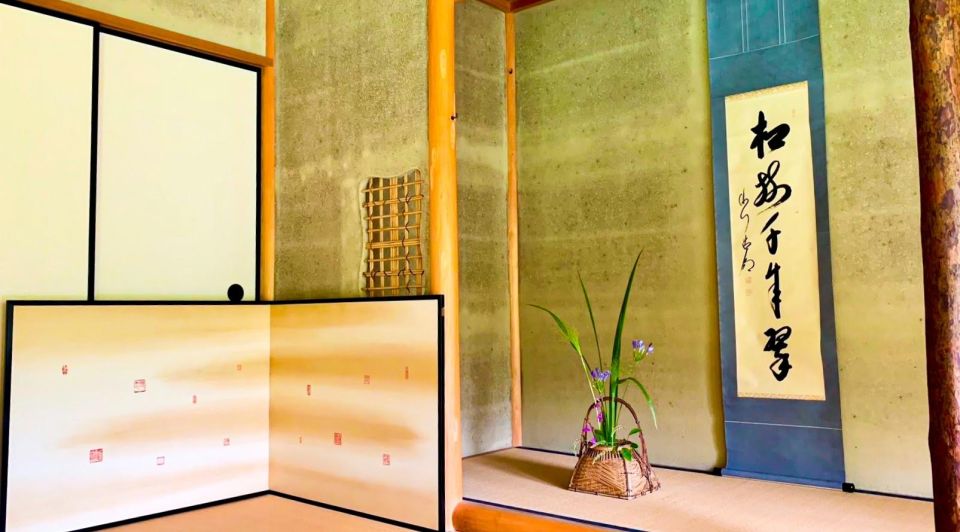
With the workshop in full swing, participants find themselves immersed not only in the intricate art of ikebana but also the serene beauty of the traditional Japanese garden surrounding them.
Lush greenery, meticulously pruned trees, and tranquil ponds with koi fish create a breathtaking backdrop that enhances the meditative experience, allowing attendees to fully appreciate the harmony between nature and the floral arrangements they’re crafting.
The Japanese garden view offers a captivating sensory experience:
- The gentle rustling of leaves in the breeze
- The soothing sound of flowing water
- The vibrant hues of blooming flowers
- The serene atmosphere of the manicured landscape
- The opportunity to connect with the natural world
Authentic Japanese Culture
Amidst the tranquil Japanese garden, participants enjoy the rich tapestry of authentic Japanese culture, guided by a descendant of an ancient samurai family.
Junko Sophie Kakizaki, a skilled practitioner of the art of ikebana, shares insights into this centuries-old tradition, revealing the deep connection between flower arrangement and the Japanese aesthetic sensibility.
Through hands-on experience, participants learn the intricate techniques and symbolic meanings behind each placement of stems and petals, understanding the harmony and balance that define this revered art form.
The workshop offers a unique glimpse into the enduring traditions that have shaped Japanese culture, fostering a deeper appreciation for the country’s enduring legacy.
Junko Sophie Kakizaki
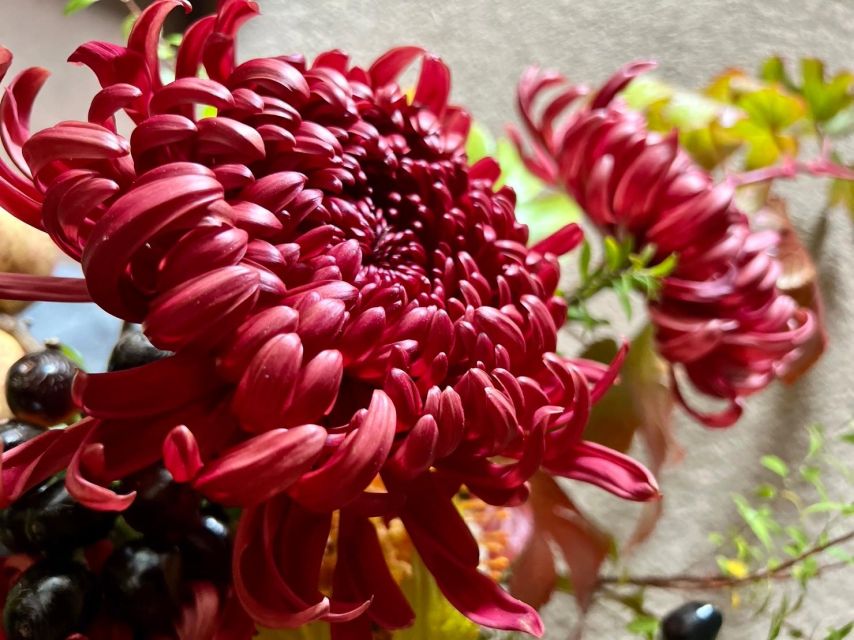
Junko Sophie Kakizaki, a skilled practitioner of the ancient art of ikebana, leads the flower arrangement workshop, drawing upon her heritage as a descendant of an illustrious samurai family.
Her instruction emphasizes the harmony between the flowers, the container, and the surrounding environment, capturing the essence of Japanese aesthetics.
Junko’s expertise in ikebana stems from her family lineage, which traces back to a long line of samurai warriors and scholars.
Participants gain a deeper appreciation for the philosophical and spiritual underpinnings of ikebana, blending the creative process with a sense of mindfulness.
Junko’s passion for preserving and passing on this centuries-old tradition is evident in her patient and insightful teaching.
Flower Materials Included
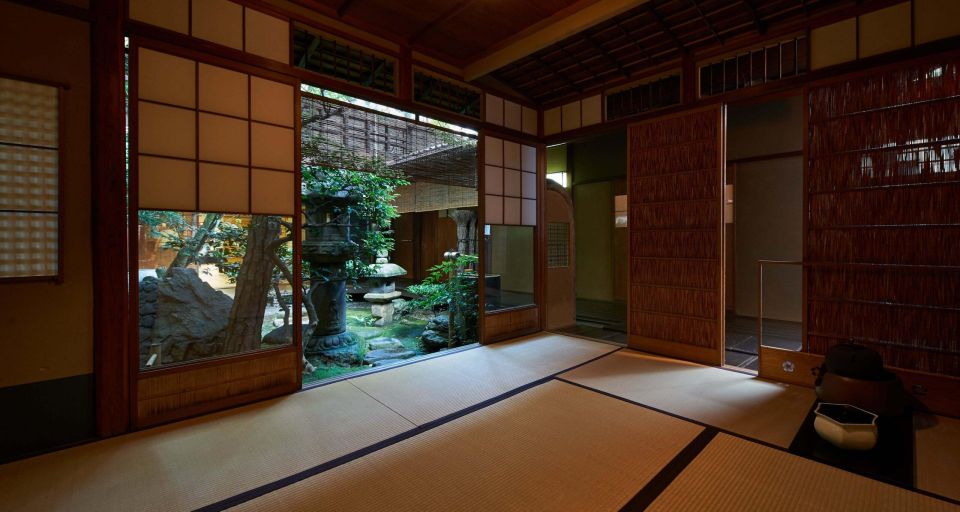
The workshop provides participants with all the necessary flower materials, including a selection of fresh blooms carefully curated by Junko. Participants will have access to flower scissors, vases, and a kenzan (flower holder) to complete their flower arrangement.
| Materials | Description |
|---|---|
| Flowers | A variety of seasonal flowers, their vibrant colors and distinct shapes ready to be transformed into a masterpiece. |
| Scissors | Sharp, high-quality flower scissors that effortlessly trim and shape the blooms. |
| Vases | An assortment of traditional Japanese vases in various sizes and styles to showcase the finished arrangements. |
| Kenzan | A metal flower frog that holds the stems in place, allowing for artistic and structural floral compositions. |
With these carefully selected materials, participants can unleash their creativity and bring their ikebana visions to life.
Exclusions and Policies
While the experience includes all the necessary materials for the flower arrangement, there are a few exclusions and policies to keep in mind. Transportation to the venue, gratuities, and food/drinks aren’t included in the package. Participants can cancel their booking up to 7 days in advance without any charges, ensuring flexibility.
The activity is limited to a maximum of 5 participants, providing an intimate and personalized experience. It will take place rain or shine, so participants should come prepared for the weather.
Plus, the workshop will be conducted at a table and chair, not in the traditional seiza (sitting straight on your legs) position. Upon request, participants can also create chabana, the flowers used in Japanese tea ceremonies.
Additional Details
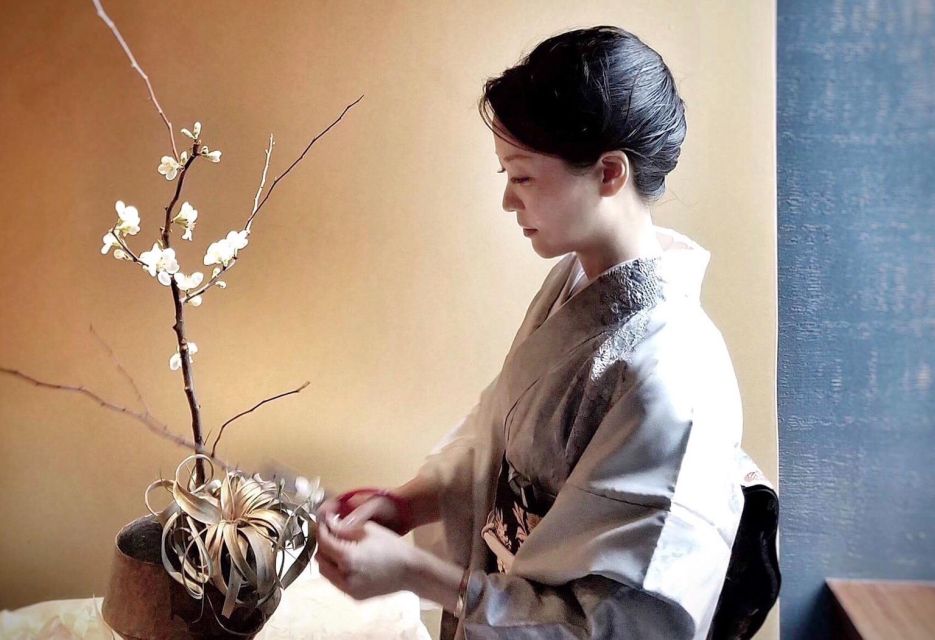
Descendent of an ancient samurai family, Junko Sophie Kakizaki, will guide participants through the intricate art of Ikebana, the Japanese flower arrangement tradition. During the workshop, guests will create their own Chabana, a style of Ikebana used for tea ceremonies, based on their preferences. The activity will take place at a traditional Japanese house, allowing participants to admire the stunning garden view as they work. Participants should note that the workshop will be held at a table and chair, not in the traditional seiza position. Rain or shine, this authentic cultural experience promises to be a highlight of any visit to Kyoto.
| Additional Details | |
|---|---|
| Workshop Location | Traditional Japanese House |
| Seating | Table and Chair (not seiza) |
| Chabana Option | Available upon Request |
| Weather | Rain or Shine |
| Samurai Family Host | Junko Sophie Kakizaki |
Here's a few more nearby tours and experiences we think you'll like.
Frequently Asked Questions
Can I Customize the Flower Arrangement Design?
Yes, clients can customize their flower arrangement design. The experienced host, Junko Sophie Kakizaki, will work closely with participants to create personalized pieces based on their preferences and interests in traditional Japanese floral design.
Is There a Dress Code for the Activity?
There is no formal dress code for the Ikebana flower arrangement activity. Participants can wear comfortable, casual attire. The focus is on the hands-on creative experience, not the attendees’ outfits.
Are Participants Required to Have Prior Experience?
No, participants do not need prior experience for this flower arrangement workshop. The activity is designed for beginners, and the expert instructor will provide all the necessary instruction and guidance throughout the session.
Can the Activity Be Extended Beyond 1 Hour?
The activity can be extended beyond the 1-hour duration, subject to availability and additional fees. Participants should check with the organizers about the possibility of extending the session and any associated costs.
Are There Any Discounts or Packages Available?
There are no discounts or packages mentioned for this activity. However, the host may offer occasional promotions or bundle deals. It’s best to check with them directly for any current offers or special pricing.
Not for you? Here's more of our most recent tour reviews happening neaby
- From Kyoto or Osaka: Private Walking Tour Through Nara
- Kyoto Culinary Quest: A Flavorful Odyssey
- Kansai Int Airport To/From Kyoto City Private Transfer
- Kyoto: Private Photoshoot in Arashiyama, Bamboo Forest
- From Osaka or Kyoto: Hiroshima and Miyajima Train & Bus Tour
- Kyoto: Tea Ceremony in a Japanese Painters Garden
- Kyoto: Personalized Guided Private Tour
- Kyoto Sake Bar and Pub Crawl (Food & Sake Tour)
- Experience Kyoto Must-Sees & Local Gems With Local Friend
- Soul of Kyoto: Timeless Traditions and Tantalizing Tastes
- Discover Magical Kyoto – a Custom Walking Adventure
- Kyoto: Private Romantic Photoshoot for Couples
- Osaka City To/From Kyoto City Private Transfer
- Kyoto: Private Session of Tea Ceremony Ju-An at Jotokuji Temple
- Kyoto : Private Custom Walking Tour With A Local Guide
Recap
Enjoy the centuries-old tradition of ikebana at a serene traditional Japanese house in Kyoto.
Under the guidance of a renowned instructor, create your own unique floral arrangement while surrounded by the lush beauty of a tranquil garden.
This captivating 1-hour workshop offers a deeper appreciation for the harmony and balance that define Japan’s enduring cultural legacy.





